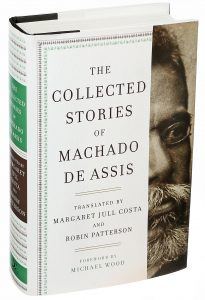Parul Sehgal in the New York Times:
 In a famous Hindu parable, three blind men encounter an elephant for the first time and try to describe it, each touching a different part. “An elephant is like a snake,” says one, grasping the trunk. “Nonsense; an elephant is a fan,” says another, who holds an ear. “A tree trunk,” insists a third, feeling his way around a leg.
In a famous Hindu parable, three blind men encounter an elephant for the first time and try to describe it, each touching a different part. “An elephant is like a snake,” says one, grasping the trunk. “Nonsense; an elephant is a fan,” says another, who holds an ear. “A tree trunk,” insists a third, feeling his way around a leg.
In the Anglophone world, a similar kind of confusion surrounds Joaquim Maria Machado de Assis (1839-1908), the son and sly chronicler of Rio de Janeiro whom Susan Sontag once called “the greatest writer ever produced in Latin America.”
To Stefan Zweig, Machado was Brazil’s answer to Dickens. To Allen Ginsberg, he was another Kafka. Harold Bloom called him a descendant of Laurence Sterne, and Philip Roth compared him to Beckett. Others cite Gogol, Poe, Borges and Joyce. In the foreword to “The Collected Stories of Machado de Assis,” published this month, the critic Michael Wood invokes Henry James, Henry Fielding, Chekhov, Sterne, Nabokov and Calvino — all in two paragraphs.
To further complicate matters, Machado has always reminded me of Alice Munro.
What’s going on here? What kind of writer induces such rapturous and wildly inconsistent characterizations? What kind of writer can star in so many different fantasies?
More here.
